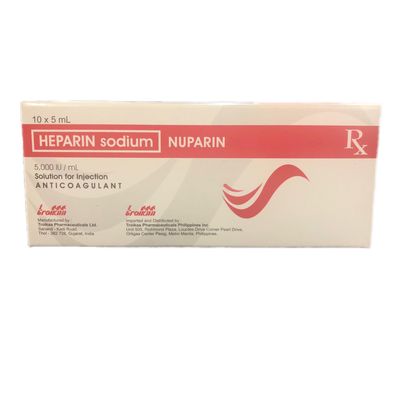Bambang Pharmaceutical Depot Inc.
Heparin Sodium (Nuparin) 5,000IU/ml Solution for Injection Anticoagulant 10 x 5ml
Heparin Sodium (Nuparin) 5,000IU/ml Solution for Injection Anticoagulant 10 x 5ml
Couldn't load pickup availability
Prevent formation of blood clots near the surface of your skin.
Certainly! Below is a comprehensive description of Heparin Sodium (Nuparin) 5,000 IU/ml Solution for Injection:
Product Description:
Heparin Sodium (Nuparin) 5,000 IU/ml Solution for Injection is a sterile solution used as an anticoagulant to prevent and treat blood clots. Heparin is a naturally occurring substance that prevents the formation of blood clots by inhibiting the action of clotting factors, specifically thrombin and factor Xa. This product comes in a 5 ml vial containing 5,000 IU (international units) per milliliter, designed for parenteral (injection) use.
It is typically used in hospitals and clinics under medical supervision for patients requiring anticoagulation therapy.
-
Active Ingredient: Heparin Sodium
-
Strength: 5,000 IU/ml
-
Formulation: Injectable solution for subcutaneous or intravenous administration
-
Pack Size: 10 vials of 5 ml each
Indications:
Heparin Sodium (Nuparin) is indicated for:
-
Prevention and Treatment of Venous Thromboembolism (VTE):
-
Includes deep vein thrombosis (DVT) and pulmonary embolism (PE), both of which are conditions where blood clots form in the veins and may travel to the lungs.
-
-
Prevention of Blood Clot Formation During Surgery:
-
Heparin is used to prevent blood clot formation during major surgeries, including orthopedic, cardiovascular, and abdominal surgeries.
-
-
Acute Coronary Syndrome (ACS):
-
Used in the management of unstable angina and non-ST-elevation myocardial infarction (NSTEMI) as part of a broader treatment plan.
-
-
Dialysis:
-
Prevents clotting in hemodialysis circuits during kidney dialysis.
-
-
Prevention of Clotting in Blood Samples:
-
Heparin is used in clinical settings to prevent blood clotting during laboratory tests.
-
Dosage and Administration:
Recommended Dosage:
The exact dosage and administration method of Heparin Sodium (Nuparin) depend on the medical condition being treated, the patient's weight, and their clinical response to therapy. Dosage guidelines are typically as follows:
-
For Prevention of Deep Vein Thrombosis (DVT) and Pulmonary Embolism (PE):
-
Subcutaneous Injection: The usual adult dose is 5,000 IU given subcutaneously every 8 to 12 hours, starting after surgery or after the diagnosis of DVT or PE.
-
-
For Acute Coronary Syndrome (ACS):
-
Intravenous Administration: An initial bolus dose of 60–70 IU/kg may be given, followed by a continuous infusion of 12–15 IU/kg/hour, adjusted according to activated partial thromboplastin time (aPTT) or anti-Xa levels.
-
-
For Dialysis:
-
Heparin is typically infused into the blood circuit to prevent clotting. The usual dose ranges from 500 IU to 1,000 IU depending on the patient's condition and dialysis needs.
-
-
For Surgery:
-
Heparin may be given as a bolus dose of 5,000 IU intravenously, followed by an infusion depending on the surgical procedure.
-
Administration:
-
Subcutaneous Injection: Administered into fatty tissue just under the skin.
-
Intravenous Injection: Can be administered via slow injection or infusion, typically in a hospital setting under supervision.
Side Effects:
While Heparin Sodium (Nuparin) is generally effective, it can cause side effects in some patients. Common and serious side effects include:
-
Common Side Effects:
-
Bleeding: The most significant risk, including minor bleeding (nosebleeds, gum bleeding) and more severe forms (internal bleeding, blood in stool or urine).
-
Bruising at the injection site.
-
Pain or discomfort at the injection site.
-
Elevated liver enzymes (transaminases).
-
Rash.
-
-
Serious Side Effects:
-
Heparin-induced thrombocytopenia (HIT): A rare but serious condition where the body’s immune system causes a drastic reduction in platelet count, which paradoxically increases the risk of blood clots.
-
Severe bleeding: Including gastrointestinal bleeding, cerebral hemorrhage, or retroperitoneal bleeding.
-
Osteoporosis (with prolonged use).
-
Allergic reactions: Symptoms like rash, itching, or swelling, especially around the face and throat (anaphylaxis).
-
Elevated potassium levels (hyperkalemia), leading to abnormal heart rhythms.
-
Contraindications:
Heparin Sodium (Nuparin) should not be used in the following cases:
-
Hypersensitivity: Known hypersensitivity or allergy to Heparin or any of its components.
-
Active Bleeding: Heparin should not be used in patients with active bleeding disorders, including conditions like hemorrhagic stroke, peptic ulcers, or significant trauma.
-
Severe Thrombocytopenia: Heparin is contraindicated in patients with a history of heparin-induced thrombocytopenia (HIT) or low platelet count.
-
Severe Liver or Kidney Impairment: Caution is advised in patients with severe liver or kidney disease due to the potential for altered drug metabolism and increased bleeding risk.
-
Uncontrolled Hypertension: High blood pressure that is not well-controlled can increase the risk of bleeding.
-
History of Cerebrovascular Accidents (Stroke): In patients who have experienced recent strokes, particularly hemorrhagic strokes, Heparin should be avoided.
-
Pregnancy: While Heparin is generally considered safe during pregnancy, it should only be used if the benefit outweighs the risk. It is classified as a Category C medication, meaning its safety has not been well established in pregnancy, especially in the first trimester.
-
Breastfeeding: Heparin is excreted in small amounts in breast milk, so it should only be used during breastfeeding if deemed necessary by a healthcare provider.
Warnings and Precautions:
-
Monitoring: Frequent monitoring of platelet counts and activated partial thromboplastin time (aPTT) or anti-Xa levels is essential during therapy to reduce the risk of bleeding complications.
-
Pregnancy and Lactation: Heparin is generally safe during pregnancy but should be used with caution. For breastfeeding women, consult a healthcare provider before using this medication.
-
Renal and Hepatic Function: Caution should be used in patients with renal or liver impairment, as dose adjustments may be necessary.
-
Surgical Procedures: Caution is advised in patients undergoing major surgeries or invasive procedures due to the increased risk of bleeding.
-
Long-term Use: Prolonged use of Heparin can lead to bone loss (osteoporosis) and fractures, particularly in elderly patients.
Storage:
-
Temperature: Store at room temperature (15°C to 25°C / 59°F to 77°F). Do not freeze.
-
Packaging: Keep the medication in its original packaging and away from direct light and moisture.
-
Keep out of reach of children.
Conclusion:
Heparin Sodium (Nuparin) is an essential anticoagulant used in the prevention and treatment of conditions related to blood clotting, such as deep vein thrombosis, pulmonary embolism, and acute coronary syndrome. Proper dosing and monitoring are crucial to avoid complications like bleeding and thrombocytopenia. It should only be used under the guidance of a healthcare professional, and patients must adhere to prescribed dosages and regular check-ups to ensure safety. Always consult with your doctor before starting this medication to ensure it is the right choice for your condition.
Share

Product Features
Highlights
Details
Lot #
Expiry Date
"For All Your Pharma And Medical Supply Needs"
-
MEDICINES
We offer large range of generics and branded tablets, capsules, topicals, suppositories, drops or suspensions, inhalers and injections.
-
SUPPLEMENTS
High quality yet very affordable vitamins and minerals, specialty supplements, herbals and botanicals, sports nutrition, and weight management.
-
MEDICAL SUPPLIES
We serve all types of medical supplies needed in clinics, laboratories, and hospitals like cottons, gauze, alcohol, swabs, gloves, bandages, lancets, glucometer, etc.
-
MEDICAL EQUIPMENT
We also serve durable and affordable medical devices and equipment needed in clinics, laboratories and hospitals.
Subscribe to our emails
Be the first to know about new collections and exclusive offers of Bambang Pharmaceutical Depot Inc.


